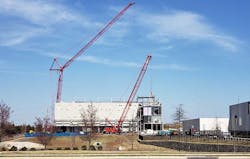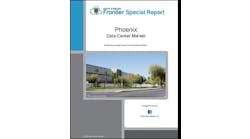How can local officials balance the economic benefits of data centers with residents’ concerns about their impact on the community? Loudoun County in Virginia has been on the front lines of this scenario, and recently passed new guidelines that limit the areas where data centers can be built. The process illustrated the challenges of restricting new development in a landscape that is already filled with more than 200 data centers.
Loudoun is among the first areas to pass regulation specifically designed to manage data center growth. But it won’t be the last, as the explosive growth of cloud computing drives a global digital infrastructure building boom.
County officials hailed the new regulations as a model for cooperation between government and industry. A data center trade group praised the process, but noted that Loudoun’s data center operators have lingering concerns about several priorities that have proven difficult to codify in the rules update.
“I think it’s a good example of what government and industry can do when they work together,” said Buddy Rizer, Executive Director, Loudoun County Department of Economic Development. “The data center industry has been at the table the whole time. I think we ended in a very good place.”
Josh Levi, the president of the Data Center Coalition, said the board heard the industry’s concerns, and that coming updates, including an overhaul of county zoning rules, may provide more assurances for both existing operators and companies that have purchased land for future data centers.
“We’re on a course to try and resolve some of the uncertainties,” said Levi. “We’ve had productive discussions with staff about implementing how this will work. ”
New Rules Address Community Concerns
In our DCF 2022 forecast, one of our predictions was that data centers will confront growing community resistance. This trend has been at the heart of Loudoun County’s efforts to manage data center growth.
The new guidelines, passed Sept. 20 by the Loudoun County Board of Supervisors, would govern the location and appearance of future data centers, seeking to address tensions stemming from the enormous growth of the cloud cluster surrounding Ashburn. Loudoun County has more data centers than anyplace on earth, with 26 million square feet of existing space, and another 8 million square feet under development.
Cloud builders’ appetite for real estate has left a limited supply of vacant land for development, prompting feedback from area residents, whose concerns include the exterior appearance of data centers, their proximity to residential neighborhoods, noise from equipment, and the impact of rising land values on affordable housing.
The updates address two issues on future data center development in Loudoun:
- Location: The county is limiting data center growth in some areas, including several where data center development had previously been “by-right.” The changes are being implemented through an update of place types in the county comprehensive plan, which will be followed by a rewrite of zoning ordinances. A major goal is to avoid data center development along Route 7, where there is limited power infrastructure to support them.
- Standards: Future data centers must meet new standards addressing high-quality building design, environmental sustainability, and their proximity to residential areas. The supervisors may also consider additional guidelines on loud noise from data center operations.
The Supervisors’ passage of the comprehensive plan update followed five months of discussion by the county Transportation and Land Use Committee (TLUC), which featured debates on the industry’s impact on land values, residential communities, tax rates, and the county budget.
“This was an extremely, extremely complex item,” said supervisor Michael Turner, who chairs the TLUC. “I wasn’t sure that this was a do-able task. There had never been a strategic discussion of data center development in Loudoun County. This is an exploding industry and has a large impact on our budget.”
“This is a collaborative effort requiring a lot of smart people to put their heads together to coexist,” said supervisor Caleb Kershner.
What’s Changing for Loudoun Data Centers
Rizer noted that “the data center industry has been supportive of the process. Most of the concerns have been addressed to some extent.”
Supervisor Kristen Umstattd pushed back on that assessment. “What I’m hearing is a polite statement that the data center industry is fine with this,” Umstattd said. “Is that true? Do they really prefer this to the status quo?”
“They certainly would prefer that nothing changed,” Rizer responded. “I believe they understand that nothing is not an option, and they have tried to be a partner in the process.”
The county’s zoning has defined several “place types” where data centers are a by-right development and eligible for fast-track approvals without the need for any hearings with local boards. This streamlined approach has been a key enabler of the rapid growth of the data center industry in Loudoun.
The changes to the comprehensive plan ended the by-right status for data centers in several place types. It also consolidated several other place types to preclude data center development. The specifics:
- The comprehensive plan amendment revised the Suburban Mixed Use, Suburban Neighborhood, and Suburban Compact Neighborhood place types to preclude data centers.
- The board also eliminated the Urban Employment Place Type and merged it with the Urban Transit Center Place Type, where data centers are not envisioned.
The second change, which expanded the Urban Transit Center (UTC) to areas including many existing data centers, was the most worrisome for the industry. The TLUC and supervisors worked with the Data Center Coalition to address concerns.
Can Data Centers Still Expand and Refinance?
The key question: What happens to existing data centers in an area where new data center development is no longer allowed? The TLUC and board determined that existing data centers will have “vested rights” from prior legislative or administrative approvals for their properties, and can continue to operate.
But will those vested rights allow data centers in these areas to expand? Or would these data centers require special exemptions from the board to add equipment or additional buildings on their current campuses?
“Given that UTC does not recommend data centers as a use, that would severely restrict these many existing data centers – billions of dollars in investment, most of which have been permitted ‘by right’ under their existing districts,” Levi wrote in a letter to the board prior to the meeting. “We view it as vital that data centers on these sites have the option to respond to market conditions and expand beyond the current by-right FAR (floor-to-area ratio) limits of their underlying zoning or their existing configuration. Older style buildings might one day seek to expand to include additional stories with a much more office-styled data center appearance. The flexibility to allow for such an evolution is important to the data center owner, the appearance of the facility, and the tax returns to the County.”
The mention of tax revenues was a reminder of the importance of data centers to Loudoun County’s economy. Data center real estate represents about 1.5% of the total land area in the county, but will contribute about 31% of all budget revenue – an estimated $575 million in fiscal year 2022. The Department of Economic Development (DED) noted that this revenue could be at risk if a reclassification impedes data centers’ ability to expand by becoming a “nonconforming use.”
“The impact of changing the permissibility of data centers could create an environment where an existing user would leave the Loudoun market because they cannot continue to expand their business use on their current property by constructing new buildings to accommodate the growth this industry is still experiencing,” the DED noted in its report.
The final form of the Sept. 20 update leaves the details of this issue to be resolved in the coming zoning update.
“What was not resolved was to provide certainty and predictability for data centers that are being moved from Urban Employment to Urban Transit Center,” said DCC President Levi. “You’re being moved into a place classification where data centers are not wanted over the long term. What does that mean when you need to update your site to make sure it can remain competitive? There’s questions as to how that will play out. When you go to the board for a special exemption does that mean you will still be able to expand?
“The board provided some assurances about their intent,” Levi noted. “But this is still an area where there is uncertainty. The question is whether other board members in the future will feel similarly. It’s unclear how future boards will approach facilities in that place type.”
“Our goal was to not have non-conforming use,” said Rizer. “We don’t want to put data centers in that position. I think we heard the data center industry loud and clear, and we’ll be able to address that in the language of the zoning rewrite. At this point, we’re probably looking at a separate process, and the data center industry will continue to be at the table going forward.”
The Status of Land Banks
Another concern was the status of land that has been purchased for data center development, but not yet entered the approval process. These “land banks” have become a priority for developers seeking runway for years of future growth in Loudoun. This appetite for land banking has pushed land values for data center parcels past $3 million an acre, up from about $500,00 as recently as 2017.
Developers who bought land at those “data center premiums” might see lower valuations if those undeveloped properties were excluded for data center use. Levi was more confident that this concern had been addressed, as the county DED has detailed documentation of future data center sites.
“The board said clearly they were not trying to change the status of properties acquired for data centers,” said Levi. “There’s visibility around making sure the county understands where a parcel has been bought for data center use. There will also be some discussions of design and environmental attributes.”
The coming zoning update will develop new standards addressing high-quality building design and environmental sustainability of data centers, as well as proximity to residential areas. The supervisors may also consider additional guidelines on loud noise from data center operations.
Board Chair Phyllis Randall was mindful of the complaints from residents about data centers and their impact on the county’s quality of life.
“The data center community is such an important economic driver in this county,” said Randall. “For me, the most important thing is not to make the data centers happy. The most important thing is to get this right.”






